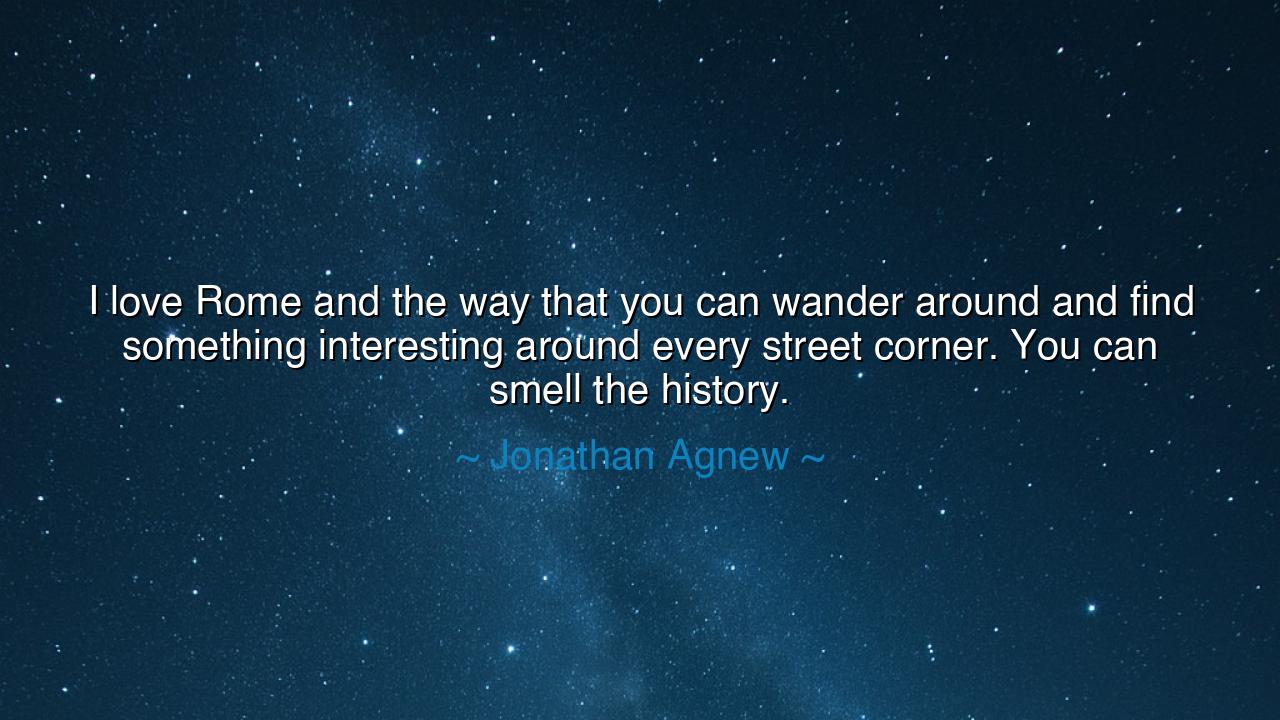
I love Rome and the way that you can wander around and find
I love Rome and the way that you can wander around and find something interesting around every street corner. You can smell the history.






The English broadcaster and traveler Jonathan Agnew once said, “I love Rome and the way that you can wander around and find something interesting around every street corner. You can smell the history.” Though spoken with simplicity, his words carry the fragrance of something eternal — a meditation on the living presence of history, and on how certain places seem to breathe with the memories of time itself. In this reflection, Agnew touches upon a universal truth: that there are cities in which the past has not perished, but walks beside the living, whispering to those who will listen. Rome is such a city — not merely a place of stone, but a living temple of memory.
The origin of this quote lies in Agnew’s awe as a traveler who beheld Rome, a city where the old world and the new embrace in a timeless dance. As a commentator accustomed to observing moments of triumph and loss upon the cricket field, he recognized in Rome a stage where humanity’s own story had been played out for millennia — from the rise of emperors to the fall of empires, from marble temples to sacred cathedrals. His phrase, “You can smell the history,” is more than metaphor; it is an evocation of that deep sensory communion between the human spirit and the past. In Rome, history is not trapped behind museum glass — it lingers in the air, clings to the stones, and moves like incense through the streets.
To “smell the history” is to awaken one’s senses to the invisible — to perceive that time itself has left an aroma, faint yet enduring, born from the passions, prayers, and sufferings of those who came before. When one walks through the Colosseum, one can almost hear the roar of the crowds and the clash of steel, yet beyond the violence, one senses the grandeur of a civilization that sought eternity. When one stands before the Pantheon, whose dome has watched the sun rise for two thousand years, one feels the humility of human creation before divine order. Every stone in Rome is a story, every shadow a fragment of memory, every echo a whisper of the ancient world calling to its children.
Indeed, there are few cities where the layers of time are so visible. Beneath the Christian basilicas lie pagan temples; beneath those temples, the remains of older homes and sacred fires. Rome is not one age — it is all ages entwined. It teaches that civilization is not built by erasing what came before, but by transforming it, preserving fragments of the past as foundations for the future. Agnew’s admiration, then, is not only for Rome’s beauty, but for its continuity — the way it carries its history not as a burden, but as its very soul. Rome has endured invasion, fire, and decay, yet she still stands, luminous and eternal, a witness to the persistence of spirit.
In this, Rome becomes a teacher. It reminds us that history is not dead, and that we, too, are part of its living current. To “wander around and find something interesting around every street corner” is to practice the art of curiosity — to see life itself as a vast city of meaning, where even the smallest detail hides a story. For those who have eyes to see and hearts to feel, every place — every street, every ruin, every human face — bears the mark of time’s artistry. To love Rome, as Agnew does, is to love the eternal conversation between past and present, between stone and soul.
Consider how Michelangelo, centuries after the Caesars, stood within that same city and sculpted the Pietà — a masterpiece that carries the same divine melancholy as the ruins of the Forum. The artist’s chisel, like the mason’s hammer before him, became a continuation of the same ancient dialogue: beauty born from suffering, faith rising from decay. In this way, each generation adds its own scent to the air — a mingling of dust and dream, toil and triumph. This is what it means to “smell the history”: to recognize that the breath of the living carries the exhalations of the dead.
Let this, then, be the lesson: wherever you walk, walk as though the ground remembers. When you pass through an old city, a home, or even a quiet field, pause and listen — for the world speaks to those who honor its memory. Do not rush through life blind to the marvels that history has woven into your path. Seek to feel the pulse of the past, not as nostalgia, but as wisdom, guiding you toward greater reverence for all that endures.
For, as Jonathan Agnew reminds us, to “smell the history” is not only to admire the beauty of Rome — it is to recognize that we, too, are its heirs. The stones of the past have built the road we walk upon; the deeds of those before us breathe in our own hearts. Walk, therefore, not as a stranger to history, but as one of its living chapters. Let your life, like Rome itself, become a testament to endurance — where every corner holds meaning, and every breath carries the scent of eternity.






AAdministratorAdministrator
Welcome, honored guests. Please leave a comment, we will respond soon